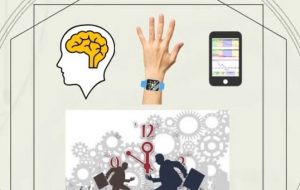Wearable Machine Interface System for Tracking and Controlling Mental Stress using Wrist-Worn Wearable Devices
Summary
Wrist-worn wearable devices provide rich sets of pulsatile physiological data under various modalities and circumstances. An unexploited capability is that the pulsatile physiological time series collected by wrist-worn wearable devices can be used for recovering internal brain dynamics. Inferring the underlying neural mechanisms and reconstruction of the mental-stress-related brain dynamics could potentially be accomplished entirely through wrist-worn wearable devices. The method is validated by analyzing electrodermal activity (EDA) pulsatile data in the context of mental-stress-related arousal and can be extended to other pulsatile physiological signals (e.g. cortisol, heartbeat data). This proposal’s outcomes will be (1) a portfolio of wrist-worn wearable-device-based brain decoders that can be optimized to exploit the constraints of a given clinical application and wrist-worn wearable device data collection capabilities; (2) a toolbox of bio-inspired controllers that can have inhibitory and excitatory effects for maintaining a neural state within a desired range.
Video Summary
Competitive Advantages
- Seamless recovery of neural stimuli from non-brain signals using wristband-like wearables
- Capable of being integrated into existing devices (e.g. smartwatch, fitness tracker) or standalone functionality
- Dynamic tracking of neural states from non-brain physiological signals in real-world environments (e.g. stress and fatigue)
- Control mechanism for maintaining a neural state within the desired range
Problem Addressed
- Cumbersome nature of day-to-day neural state monitoring with EEG headsets (e.g. in social settings)
- Need for automated stress management (stress increases cardiovascular disease risk)
- Inability to acquire real-time neural state feedback from loved ones (e.g. elderly parents, young children), students and employees (e.g. optimize work schedules)
Applications
- Wearable electronics
- Detect and manage human stress and anxiety automatically (e.g. workplace, piloting, driving)
- Learning experience evaluation including e-learning
- The remote elderly person or care-recipient monitoring
Patent
US 62614070-Provisional US Application
Meet the Inventors

Rose T. Faghih, PhD, Assistant Professor

Md. Rafiul Amin, PhD student

Dilranjan S. Wickramasuriya, PhD student

Hamid F. Azgomi, PhD student
Contact
George Gillespie, Technology Transfer Associate
oipm@Central.uh.edu | 713-743-1053 Case ID: 2018-021

